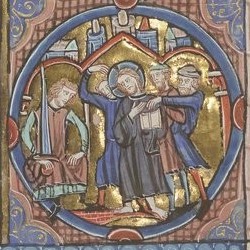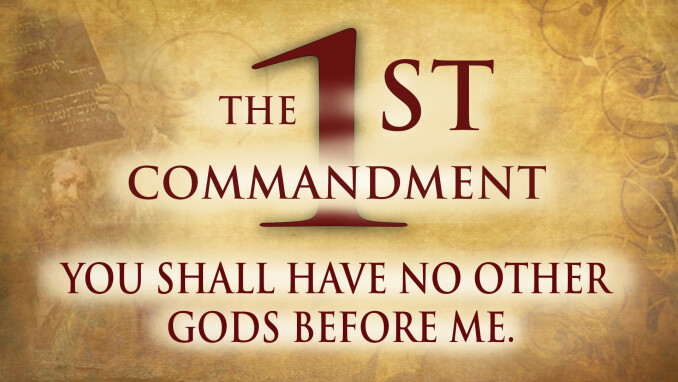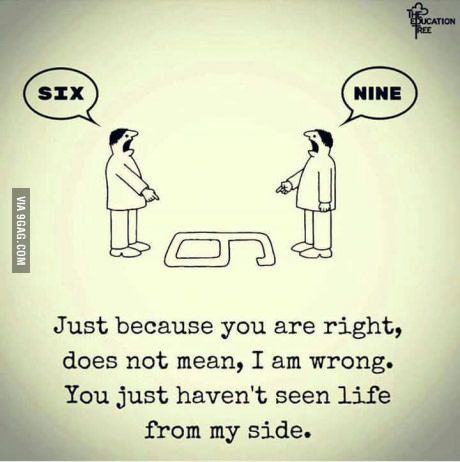The concise letter of Jude calls for faithful Christians to contend for the faith in the face of false teachers within the church, “who pervert the grace of our God into licentiousness and deny our only Master and Lord, Jesus Christ” (Jude 3-4 NRSV).
“Grace” is a common term between genuine and false teachers. Both use the same word, but with different meanings. As someone has said, “they share the same vocabulary but use different dictionaries.” False teachers, who slip in the church on false pretenses, interpret grace in such a way to give people a green light for “licentiousness” (GK: aselgeia). It’s a term associated especially with the pursuit of illicit sexual pleasure, as v. 7 indicates with its reference to Sodom and Gomorrah’s indulgence in “sexual immorality” and “unnatural lust.” Unlike many modern Methodist theologians, Jude here clearly connects grace to morality and morality to the Lordship of Jesus Christ. He understands that some may affirm the Lordship of Jesus with their lips, but deny it by their behavior (see Luke 6:46; Matt 7:13-29).
United Methodist congregations, lay members, and pastors find themselves torn between two competing visions of grace. Progressives promote a vision of grace that emphasizes acceptance and affirmation, especially as it pertains to sexuality and gender identity. Whereas traditional Christianity has maintained that blurring the lines between the genders sexually (Lev 18:22; Rom 1:26-27) and in terms of identity (Deut 22:5) is contrary to God’s design in nature, progressives see the wide variety of potential sexual expressions and gender identities as all good, God-given expressions of nature.
What started out as a push for the acceptance and celebration of monogamous same-sex marriages, as predicted, has become a call for the acceptance and celebration of all possible expressions of the LGBTQIA+ spectrum. As the popular progressive Lutheran (ELCA), Nadia Bolz-Weber puts it: “God created us as sexual beings in endless variety. WE DENY that the only type of sexual expression that can be considered holy is between a cis-gendered, heterosexual, married couple who waited to have sex until they were married.”
In 2019, like many annual conferences, the Western NC Conference of the UMC passed a petition that declared the traditional position of the church to be evil, unjust, and oppressive and even “inconsistent with the gospel of Jesus Christ.” The petition also encourages the promotion of the entire LGBTQIA+ spectrum. During discussion, one lay delegate asked for clarification of all the letters and the + at the end. A progressive delegate explained that the + includes orientations and gender identities yet to be named or discovered. Indeed, some mainline churches, including UMC’s, are even employing drag queen ministers who are clearly promoting the celebration of that “endless variety” (see UM News report promoting one such ministry).
Progressive and traditional Methodists both emphasize grace. It’s not enough, however, to simply declare that one believes in salvation by grace. The question is what do the differing camps mean by that? Whereas progressives emphasize grace as inclusion via affirmation, traditionalists see grace as inclusive by way of invitation, yet transformational via forgiveness and new birth. Traditional Methodists, in harmony with the promises of the new covenant, know grace to include the removal of hard hearts that resist obedience to God’s law, and the gift of a new heart, a new spirit, and the gift of God’s very own Spirit, who gives believers a new set of desires and the power to overcome sin to live life in harmony with the commandments of God (Jer 31:31ff; Ezk 36:22-27).
Traditional Methodists know that life in the flesh, under the power of sin, leaves us helpless and hopeless to overcome human desire distorted and misdirected to the wrong pursuits apart from the grace of God (i.e. Rom 7). But we also know that by the power in the sacrificial death of Jesus and in the Holy Spirit, we can overcome the power of sin in order to live a life wherein “the righteous requirements of the law might be fulfilled in us, who walk not according to the flesh but according to the Spirit” (Rom 8:4 – Paul here clearly referring to the fulfillment of the new covenant promise). Nonetheless, we are also well aware that believers need to help one another and encourage one another to remain on guard, as Paul warns, against the mind of the flesh, which is “hostile to God;” for “it does not submit to God’s law–indeed it cannot, . . .” (Rom 8:7).
Whereas progressives tend to pit grace against law, the particulars of the promises of the new covenant itself demonstrate the harmony between them. Contrary to popular opinion, Jesus didn’t have a problem with the promotion of obedience to the law. What he had a problem with was the legalism associated with manmade traditions that misinterpreted the law to be too strict with regards to some issues (i.e. sabbath keeping) and on other issues developed clever ways to provide loop holes around the commandments. Jesus didn’t criticize the Pharisees for taking the law too seriously; he criticized them for their hypocrisy and abandoning God’s commandments in favor of human tradition. “Then he said, ‘You have a fine way of rejecting the command of God in order to keep your tradition'” (Mark 7:9).
Indeed, Jesus insisted:
Do not think that I have come to abolish the Law or the Prophets; I have come not to abolish but to fulfill. For truly I tell you, until heaven and earth pass away, not one letter, not one stroke of a letter, will pass from the law until all is accomplished. Therefore, whoever breaks one of the least of these commandments and teaches others to do the same will be called least in the kingdom of heaven, but whoever does them and teaches them will be called great in the kingdom of heaven. For I tell you, unless your righteousness exceeds that of the scribes and Pharisees, you will never enter the kingdom of heaven.
Matt 5:17-20
Commenting on this after insisting there is no contrariety between gospel and law and referring to the promise of the new covenant from Jeremiah, John Wesley warned:
But if these things are so, we cannot be at a loss what to think of those who in all ages of the Church, have undertaken to change or supersede some commands of God, as they professed, by the peculiar direction of his Spirit. Christ has here given us an infallible rule, whereby to judge of all such pretensions. Christianity, as it includes the whole moral law of God, both by way of injunction and of promise, if we will hear him is designed of God to be the last of all his dispensations. There is no other to come after this. This is to endure till the consummation of all things. Of consequence, all such new revelations are of Satan, and not of God; and all pretences to another more perfect dispensation fall to the ground of course. “Heaven and earth shall pass away;” but this word “shall not pass away.”
Sermon 25 On the Sermon on the Mount
Wesley would go on to say “no allowance is made for one darling lust; no reserve for one idol; no excuse for refraining from all besides, and only giving way to one bosom sin.” In this sermon and another in his series on the Sermon on the Mount, Wesley also warned about well-meaning, good-natured men, and genteel intellectuals and concerned ministers, who “above all, come in the appearance of love” (Sermon 32 On the Sermon on the Mount), who in some form or fashion pit gospel against law and encourage people in sin.
The crisis in the United Methodist Church today over sexuality is merely a symptom of much more serious differences. At the root is contradictory and competing visions of the nature and authority of Scripture. Many among progressives will deny this, and say that we just interpret Scripture differently. It is true that we interpret Scripture differently, but we do because we have very different views about what Scripture is.
Adam Hamilton, one of the most prominent leaders of the liberal and progressive movement, who literally has his own section of Cokesbury, has stated that some sections of the Bible never reflected the heart and character of God. He pits his vision of Jesus against the Bible, at least those parts that he deems unworthy of the character of God revealed in Jesus. He teaches the Bible is more a word about God, than a word from God; that humans who wrote portions of the Bible were merely describing experiences of the divine the best they could but sometimes got it wrong. Moreover, he more than suggests that as a whole the Bible is not the word of God, but portions of it may be. Hamilton’s view of the inspiration of the Bible in general is that it is inspired in the same way that even modern Christian authors may be inspired. He seems to prefer divine “influence” instead of inspiration.
Taken together, the implication of Hamilton’s teaching is that modern authors may by inspiration of the Spirit correct the authors of Scripture and therefore be preferred to certain passages of Scripture. He certainly feels free to do that himself (see his book Making Sense of the Bible or here for the nutshell version). And do note that Hamilton is one of the more moderate progressives.
Contrast Hamilton’s view with what Wesley says in his preface to his New Testament Notes:
The Scripture therefore of the Old and New Testament, is a most solid and precious system of Divine truth. Every part thereof is worthy of God; and all together are one entire body, wherein is no defect, no excess. It is the fountain of heavenly wisdom, which they who are able to taste, prefer to all writings of men, however wise, or learned, or holy.
John Wesley Preface to New Testament Notes
Hamilton’s view is in contradiction to Wesley’s statement above, but also to the doctrinal standards of the United Methodist Church found in the Articles of Religion and Confession of Faith.
Article 6 of the Articles of Religion says the Old and New Testament Scriptures are the sufficient standard for Christian faith and practice with regards to things necessary for salvation and Article 7 says:
The Old Testament is not contrary to the New; for both in the Old and New Testament everlasting life is offered to mankind by Christ, who is the only Mediator between God and man, being both God and Man. Wherefore they are not to be heard who feign that the old fathers did look only for transitory promises. Although the law given from God by Moses as touching ceremonies and rites doth not bind Christians, nor ought the civil precepts thereof of necessity be received in any commonwealth; yet notwithstanding, no Christian whatsoever is free from the obedience of the commandments which are called moral.
Hamilton’s teaching is contradictory to Wesley’s and to these articles. And because there are contradictory and competing views of the nature and authority of Scripture (including its general reliability) progressives and traditional Methodists do interpret things quite differently.
While progressives say they respect the authority of Scripture they do so in a very different and limited sense. One indication is that those promoting “the continuing UMC” seek to narrow the range of essentials to exclude beliefs regarding sexual morality. Prominent leaders, for example, repeatedly assert that because the doctrinal standards don’t say anything about sexual orientation or gender identity those issues are in the non-essential category. But the doctrinal standards, the Articles of Religion, for example, do not suggest that they themselves are the sufficient standard for Christian faith and practice and the sum total of essential Christian doctrine. Clearly they point us to the Bible for what it is we are to believe and how it is we are to live. And the Bible clearly places sexual morality in the category of core moral doctrine as it regards salvation. Hence, the repeated warnings in the Bible about unrepentant sexual immorality keeping one from entering into God’s kingdom (i.e. 1 Cor 6:9-10; Gal 5:9; Eph 5:3-6; Rev 21:8). To suggest these issues are indifferent matters of opinion is to devise a manmade tradition in order to sideline the moral law of God.
But the distortion of grace goes much further. What at best is the kind of doctrinal indifference that John Welsey called the “spawn of hell,”(Sermon 39 Catholic Spirit) has made allowances for Bishop Karen Oliveto to teach that the church has been wrong to make an idol out of Jesus and that Jesus himself was led by a Syrophoenician woman to repent of bigotry as if he was an ordinary sinner like the rest of us (this has become a popular and common teaching among progressive mainliners). It has also led United Methodist leaders to promote the ministry of Nadia Bolz-Weber (mentioned above), who in her book Pastrix refers to the wiccan goddess as something like God’s aunt, merely another expression of the divine. This is obviously in defiance of the first commandment! Those promoting the misleadingly called “Continuing UMC” will insist they are not going to change the doctrinal standards. Of course they won’t. Just look how far they’ve gotten ignoring, disregarding, and . . . redefining them!
I just saw a report of a UMC pastor who says we need to do away with the idea that people need to be born again and the concept of original sin upon which it is based, along with the doctrine of hell. These kinds of declarations are not new. He renounces these historic Christian doctrines, which are also doctrinal standards of the UMC, as harmful fantasies. Instead, he preaches: “We are evolving creatures striving to emerge from the primal ooze of our past to achieve a more advanced form of life.” And he’s more likely to be promoted than reprimanded in the “continuing UMC.” Indeed, it’s more likely that I’ll be reprimanded for writing this article.
In these days of decision when United Methodists are deciding between whether to remain in the “Continuing UMC” or to go with the Global Methodist Church, the decision will require some serious consideration of which vision of grace you would choose. Grace that gives license for immorality and denial of the Lordship of Jesus Christ? Or grace that transforms as it forgives and heals hardened hearts for obedience to God’s holy word? Consider the final word of admonition from Jude.
But you, beloved, must remember the predictions of the apostles of our Lord Jesus Christ; for they said to you, “In the last time there will be scoffers, indulging their own ungodly lusts.” It is these worldly people, devoid of the Spirit, who are causing divisions. But you, beloved, build yourselves up on your most holy faith; pray in the Holy Spirit; keep yourselves in the love of God; look forward to the mercy of our Lord Jesus Christ that leads to eternal life. And have mercy on some who are wavering; save others by snatching them out of the fire; and have mercy on still others with fear, hating even the tunic defiled by their bodies.
Now to him who is able to keep you from falling, and to make you stand without blemish in the presence of his glory with rejoicing, to the only God our Savior, through Jesus Christ our Lord, be glory, majesty, power, and authority, before all time and now and forever. Amen.
Jude 17-25
Article written by Rev. Dr. Cliff Wall





 Monastery at the Mount of Temptation
Monastery at the Mount of Temptation



